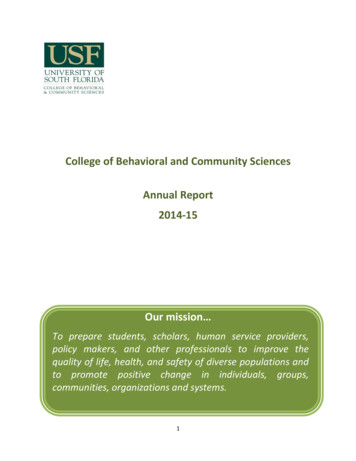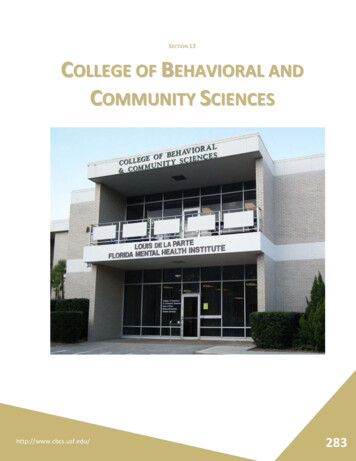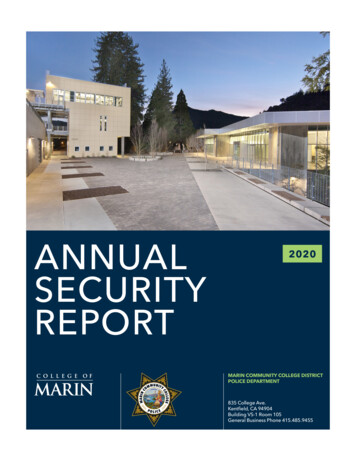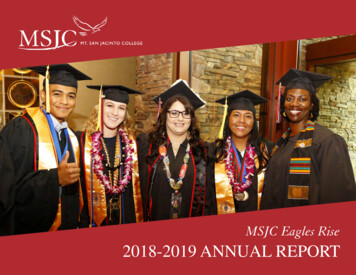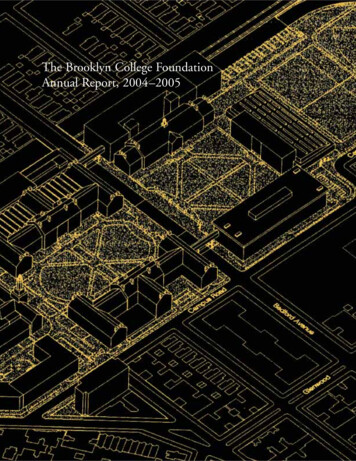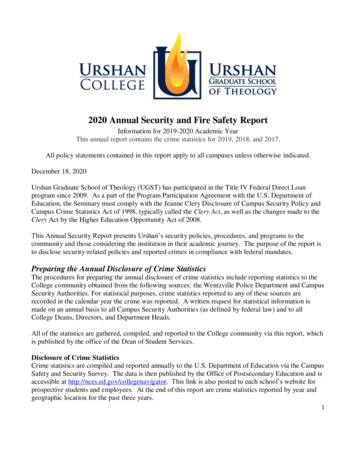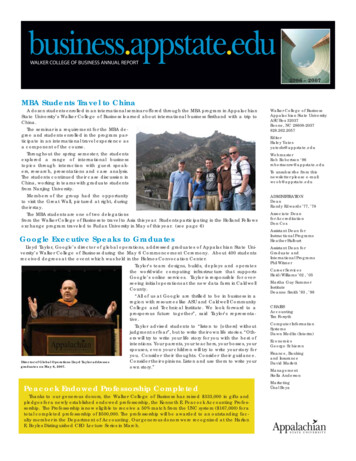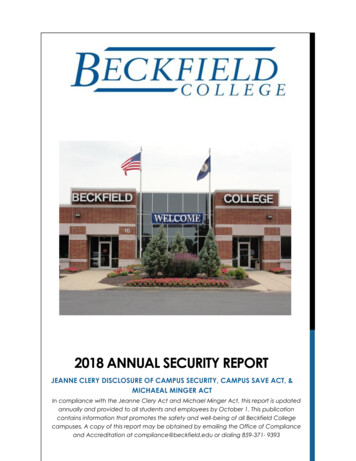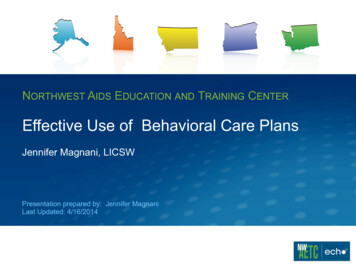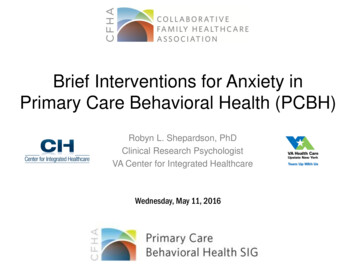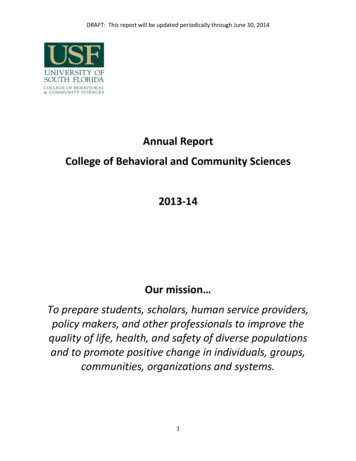
Transcription
DRAFT: This report will be updated periodically through June 30, 2014Annual ReportCollege of Behavioral and Community Sciences2013-14Our mission To prepare students, scholars, human service providers,policy makers, and other professionals to improve thequality of life, health, and safety of diverse populationsand to promote positive change in individuals, groups,communities, organizations and systems.1
DRAFT: This report will be updated periodically through June 30, 2014CBCS Annual Goals2013-14The goals of the College of Behavioral & Community Sciences are to be recognized within the Universityand the United States for its high quality academic programs, leading edge research, and the activeengagement of community partners in our teaching and research endeavors. In order to accomplishthese goals, CBCS will: Continue to realize a steady increase in SCH productivity. Employ practices to increase retention and graduation rates of students. Promote mechanisms to increase the number of courses and programs delivered through online formats. Expand international experiences for students and faculty. Enhance the infrastructure to promote faculty success in research and scholarly productivity. Increase the number of research proposals submitted and awarded. Increase the number of post-doctoral fellowships. Initiate a Safety Campaign to promote a safe environment for students, faculty, and staff. Enhance revenues through innovative program delivery mechanisms and donor contributions.The following sections of this report will provide an update on the progress the College made towardachieving these goals in 2013-14.2
DRAFT: This report will be updated periodically through June 30, 2014Instructional Productivity Instructional productivity continued to increase within the college reaching an all-time high of67,839 SCH.CBCS Student Credit Hours70,00065,00060,00055,00050,00007-08 08-09 09-10 10-11 11-12 12-13 13-14Student Success: Retention and Graduation Retention of First Year students increased from 74% for students admitted in Fall, 2011 to 77.8%for students admitted in Fall, 2012. Only 10 undergraduate students in the college will graduate in the spring, 2014 semester withexcess hours (i.e, hours over the allowable 132). However, in the past three semesters (spring,2013, summer, 2013, fall, 2013), 154 students had more than the 132 allowable hours at thetime they graduated. This represented 21.8% of undergraduates who completed their degrees.Most of these excess hours were obtained prior to enrolling in a BCS major. The number of students completing their undergraduate degree increased from 692 in 2011-12to 704 in 2012-13. The number of master’s students declined slightly (from 255 to 224) whilethe number of doctoral degrees increased from 18 to 24. The percent of bachelor’s graduates employed inFlorida following graduation was at or above thestatewide level for all CBCS undergraduate programsin 2013. The median average full-time wages ofundergraduates employed in Florida one year aftergraduation was at or above the state average withthe exception of Social Work which was slightlybelow the statewide average.3
DRAFT: This report will be updated periodically through June 30, 2014On-Line Course Delivery Approximately 4,700 students enrolled in 92 sections of courses offered by CBCS faculty in 201213. This number will be used as a baseline to project future growth of online classes within thecollege. The College participated in the Innovative Education pilot program which provided funding andtechnical assistance for faculty to develop five new online courses and to enhance twoadditional online courses. Over 40 faculty completed the T101 Course to enhance on-line learning. The College contributed funding to support the conversion of four additional courses within thecollege to develop a fully on-line degree program, the Masters in Child and AdolescentBehavioral Health. The College Curriculum Committee established a workgroup to review proposals for futuredevelopment of on-line classes. The workgroup plans to host an On-Line Learning showcase inFall, 2014 to highlight the variety of approaches used by faculty in our college who teach on-linecourses. A new on-line certificate in Cybersecurity was initiated through the Department of Criminology.International Experiences for Students and Faculty The College once again offered two study-abroadprograms in Florence, Italy to provide students withthe opportunity to study comparative behavioralhealth. A new study-abroad program offered through MHLPwas developed for students to study homelessnessand behavioral health in Ireland. The School of Social Work will offer its first StudyAbroad Program this year. The program is designedto provide students with theory, practice skills, andtechniques for social work with Indigenouspopulations. CBCS faculty conducted work with internationalpartners in Australia, Canada, China, Chile, theCzech Republic , Ghana, Haiti, India, Israel, theNetherlands, Nicaragua, Singapore, South Korea,and Turkey.4
DRAFT: This report will be updated periodically through June 30, 2014Research Infrastructure and Productivity The first Associate Dean for Research for the College was hired inJuly, 2013 for the purpose of enhancing the college researchinfrastructure and facilitating research proposal development. Activities to date include: A new Research Mentorship Forum was established with ninenew events such as NSF Career awards, K awards, Identifyinga funding source, grant management, and summer researchproductivity. Plans were developed to initiate a CBCB Research Council A college-wide C&G tracking database was develop A new staff member was hired to assist with pre and postaward activities. CBCS faculty continued their strong record of research dissemination by publishing 268 articles,12 books, 79 chapters in books, and 38 research reports. In addition, the faculty made 429presentations at international, national, and regional eports38221015000Presentations429169386880244033 Research expenditures increased from 23.6 million in 2012 to 24.3 million in 2013. Federalresearch expenditures increased from 20.5 million to 21.1 million. F&A returns increased from 2.5 million in 2012 to 2.7 million in 2013 while the total indirectcost return rate increased from 10.7% to 11.5%. Research expenditures per tenured/tenure earning faculty member (TTE) increased from 322,931 in 2011-12 to 353,608 in 2012-13. The number of proposals submitted decreased (158 vs. 117) but the amount requestedincreased from ( 68 million in 2012 to 73 million in 2013). The number of new awardsdecreased between 2012 and 2013 (84 vs. 69) as did the amount of new dollars awarded ( 29million to 24 million). However, for 2013-14, the number of applications is above the prioryear.5
DRAFT: This report will be updated periodically through June 30, 2014 The number of post-doctoral appointments increased from 20 in2012 to 22 in 2013. The five-year trend reflects a significantincrease over 2009 when only 6 post-doctoral fellows wereappointed in the college. The College initiated a new system to support faculty who havepotential for becoming nominated for distinguished honors andawards such as the AAAS Fellows program. Twelve CBCS students had papers accepted for presentation atthe 2014 USF Undergraduate Research and Arts Colloquium. Astudent being mentored by an MHLP faculty member was arecipient of the Excellence in Undergraduate Research Award.Safety Campaign In response to faculty concerns about campus safety, the Collegelaunched a safety campaign featuring a series of Safety Messagesfrom the Dean alerting employees to enhancements in buildingsecurity, announcements, and safety tips. A representative from the University Police established an officewithin the MHC complex and initiated regular patrols in theevening within the MHC building and surrounding area. A plan has been developed to install television monitors at themajor entrances to the MHC building to relay emergencymessages and safety instructions.Revenue Enhancement The College continued to make progress in fundraising by achieving 71% of the UnstoppableCampaign goal. The college experienced a 21% increase in annual giving between FY13 and 14. The College established its first Alumni Relations Board to engage alumni in friend-raising andfund-raising activities of the college. The College participated in the on-line learning rebate program established through InnovativeEducation and generated an additional 84,710 for the college and its academic departments. The ABA on-line certificate, a new market-based program, was approved by the Board ofGovernors. The Department of Child & Family Studies obtained funding to begin programdevelopment and will be working with the company, All Campus, to facilitate marketing of the6
DRAFT: This report will be updated periodically through June 30, 2014certificate which will lead to Board Certification for Behavior Analysts and Assistant BehaviorAnalysts. MHLP maintains on-line training contract with Netsmart to market training modules developedby faculty and staff. During the past two fiscal years this contract has generated approximately 25,000 in revenue. Within the Department of Communication Sciences & Disorders, the clinical Auxiliary operationswere expanded to include a contract with Tampa General Hospital Rehabilitation Services toprovide Audiology services. The department continued its contracts with Tampa GeneralHospital to provide Newborn Hearing Screeners, with Children’s Medical Services to provideAudiology services to the monthly Craniofacial Clinic, and Expanded Hands on USF services,contracting with USF Health and providing interpreting services for theater productions.7
DRAFT: This report will be updated periodically through June 30, 2014Department and School Annual Reports2013-14Highlights and ExcerptsComplete Documents AvailableFrom Department Chair or School Director8
DRAFT: This report will be updated periodically through June 30, 2014Department of Child and Family StudiesCFS is committed to improving the well-being of individuals, children, and families who need specialattention and support to resolve issues of mental health, disability, education and healthy development.We strive to ensure that appropriate services and supports are available through our leadership inresearch and evaluation, theory, policy, and practice innovation. The Department of Child & FamilyStudies (CFS) consists of 206 employees including 14 tenure and tenure-track faculty, 28 researchfaculty, 69 research staff members including social & behavioral researchers, statistical data analysts,training support specialists and community outreach caseworkers, 3 post docs, 10 graduate assistants,37 OPS researchers, 26 student assistants and 18 administrative staff.Accomplishments for 2013-14 CFS has transformed itself from a research-only department to a department that is developingits capacity to provide academic programs. From 2006-2007 to 2012-2013 CFS undergraduateSCH grew by 830%. In the same time period, CFS Graduate SCH grew by 225%. The department initiated the new Ph.D. in Applied Behavior Analysis and accepted its firstcohort of six doctoral students.The department submitted a proposal to establish a new Master of Science degree in Child andAdolescent Behavioral Health with an anticipated start date of 2014/15.A new market-based online Graduate Certificate in ABA was one of only two programs approvedin the USF system. The online certificate covers the content required to prepare students for thenational Behavior Analyst Certification Board exam.The inaugural cohort of students from the Graduate Certificate Program in TranslationalResearch in Adolescent Behavioral Health presented their service-learning research projectsalongside Academic Mentors and Community Agency Partners at the 27th Annual Children’sMental Health Research & Policy Conference.During the 2013 program year, 11 students graduated with a certificate from Positive BehaviorSupport, designed for those who want to specialize in resolving challenging behavior andsupporting the pro-social behavior of children and youth within schools and early educationsettings.23 students in the Applied Behavior Analysis (ABA) Master’s program graduated with theirmaster’s degree in 2013, the highest number yet since the program began in 2006. Recent 9
DRAFT: This report will be updated periodically through June 30, 2014accomplishments of students include: 19 papers/chapters published or in press in 2013; 15papers submitted for publication; 22 presentations at the 2013 Association for Behavior AnalysisInternational Conference; and 28 presentations at the 2013 Florida ABA conference.Research and Scholarly Productivity Departmental faculty published 63 articles and 2 books in 2013-14 and made 169 presentationsat professional conferences. CFS received federal awards totaling 6.7 million and non-federal awards totaling 3,.4 million.Community Engagement ABA Students provided over 35,000 hours of community service through practicum placements. CARD-USF served 4,464 professionals with 2,992 technical assistance consultations and 3,861families with 432 new constituents joining CARD during this year. The Interdisciplinary Center for Evaluation and Intervention (ICEI) provided services to 287children, 122 parents, and 9 school districts. The Home Instruction for Parents of Preschool Youngsters (HIPPY) served approximately 1,563children from 1,388 families. The Quality Counts for Kids: Program-wide Positive Behavior Support (PWPBS) programprovided 28 community trainings to 882 providers. The Florida Program-Wide Positive Behavior Support (PWPBS) program provided 29 communitytrainings (with 45 seats each) to 650 unduplicated providers in the community. Florida’s Positive Behavior Support Project: Multi-Tiered System of Support Project (PBS) trained147 schools in Tier 1 and 86 were trained in Tier 2. 86 behavioral health professionals were certified or recertified representing 15 Florida agencieson the Child & Adolescent Needs and Strengths (CANS), a Systematic assessment of child andfamily needs and strengths.Global Engagement/International Activities Dr. Ray Miltenberger was appointed to the Association for Behavioral Analysts International(ABAI) Council as applied representative in 2013. Dr. Kwang-Sun Cho Blair worked with three international scholars from South Korea whopartnered with CFS on Positive Behavior Support through the USF Exchange Visitor Program. Dr. Mario Hernandez became a member of HIPPY International and participated in theinternational planning meeting in Argentina. CFS faculty were invited to conduct two one-day workshops at the Canadian Association forSuicide Prevention’s Annual Conference in Fall 2012. The fifth edition of Behavior Modification: Principles and Procedures, a text written by Dr. RayMiltenberger, was translated into Spanish. The translated text, Modificación de conducta:Principios y procedimientos, will help to reach an expanding segment of future professionalsbeing trained to work as behavior analysts.Faculty and Program Recognition FCIC was announced as the winner of the About.com 2013 Readers' Choice Award for FavoriteSpecial-Needs Regional Resource. Among their other accomplishments for FY2013: Dr. David Chiriboga received the Gerontological Society of America's (GSA) Minority MentorshipAward.10
DRAFT: This report will be updated periodically through June 30, 2014 Dr. Elizabeth Perkins received Fellow Designation from the American Association on Intellectualand Developmental Disabilities. She also served as guest editor on a Special Issue of theAmerican Journal on Intellectual and Developmental Disabilities.Stephen Roggenbaum was reappointed to the Florida Suicide Prevention Coordinating Council.WUSF profiled the Positive Behavior Support Program during Mental Health Awareness Month.Dr. Karen Berkman was profiled in the Chronicle of Higher Education.Governor Rick Scott Appointed Dr. Lise Fox to the Florida Developmental Disabilities Council.Dr. Mary Armstrong was elected president of the American Orthopsychiatric Association, aninterdisciplinary association devoted to mental health, health, and social justice.Drs. Lise Fox and Carol MacKinnon-Lewis were listed as among the Top 100 USF Researchers List.Dr. Lise Fox was honored with the Mary McEvoy Service to the Field Award.Development and Fund Raising CFS currently has over 260,000 in funds to support the autism program, the HIPPY program,ABA scholarships, Florida KIDS COUNT, The Learning Academy, and a general department fund.Diversity The Linking Actions for Unmet Needs in Children’s Health (Project LAUNCH) Evaluation, a newlyfunded program through 2017, aims to integrate evidence-based mental health/behavioralhealth services with other early childhood services to reduce disparities in cognitive, behavioral,social, and physical development of young children (0-8) whose parents are at risk or areinvolved in substance use.CFS was selected as a member of the Technical Assistance Network for Children’s BehavioralHealth (TA Network), the new national center for states and communities funded by theComprehensive Community Mental Health Services for Children and Their Families Program(Children’s Mental Health Initiative or CMHI). CFS, in partnership with the Center for CommunityLearning, Inc. in Miami, will be the Cultural and Linguistic Hub of the TA Network.Since its inception 5 years ago, The Learning Academy has graduated 47 students on the autismspectrum, with 15 students currently enrolled.Interdisciplinary Collaborations The Graduate Certificate offered through the Institute for Translational Research in AdolescentBehavioral Health: The Institute is a collaborative effort between local adolescent-servingcommunity agencies and the USF College of Public Health (COPH) and CFS.CFS and the USF College of Public Health (COPH) jointly offer a specialty concentration inbehavioral health as part of the master and doctoral programs in the COPH Department ofCommunity & Family Health.Entrepreneurial Approaches to Conducting Business ABA online Continuing Education learning modules were launched in 2013.The online Graduate Certificate in ABA was one of only two programs approved by the USFSystem. The Certificate is an extension of the existing USF Master of Arts in ABA and utilizes thesix core courses from the existing program, which are approved pursuant to regulation 8.011.The coursework covers the content required to take the certification exam from the BehaviorAnalyst Certification Board.11
DRAFT: This report will be updated periodically through June 30, 2014Communication/Marketing The 27th Annual Children’s Mental Health Research & Policy Conference hosted more than 550researchers, and others in a four-day conference that included over 70 concurrent sessions, fivekeynote/plenary presentations, and fifty poster presentations during two poster sessions.Over 550 participants attended the National Training Institute, hosted by the TechnicalAssistance Center on Social Emotional Intervention for Young Children (TACSEI).Florida KIDS COUNT increased awareness of child and family issues through internet and printmedia.CFS Faculty were quoted in over 30 news/video articles.The CARD website had 2,006,383 hits from over 125 countries. The CARD-USF site expanded itssocial media by distributing 12 newsletters, posting on Facebook, Twitter, and Pinterest.Florida’s Positive Behavior Support Project: Multi-Tiered System of Support Project (PBS) sitegenerated 6.1 million hits with 16,015 hits on average per day.The FCIC website received 15,844,708 hits by 39,767 visitors.The Center for Child Welfare – Florida’s Center
A new market-based online Graduate Certificate in ABA was one of only two programs approved in the USF system. The online certificate covers the content required to prepare students for the national Behavior Analyst Certification Board exam. The inaugural cohort of students from the Graduate Certificate Program in Translational
